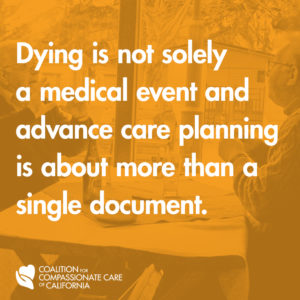
From its beginnings, the Coalition for Compassionate Care of California has fostered collaboration to improve how we prepare for medical decisions when we are facing serious illness or the dying process. Public engagement has been an integral part of the Coalition’s work, involving countless community and healthcare leaders throughout the state. These leaders have helped develop outreach strategies and educational programs at the statewide level, while also working hard in the trenches forming
community coalitions and sponsoring
local advance care planning (ACP) activities.
As part of the Coalition’s public engagement team for a number of years, I was fortunate to work with many of these leaders. The Coalition believed that since dying is not solely a medical event and advance care planning is about more than a single document, it was important to move the process “upstream,” before a crisis. We wanted to take our messages to individuals and families in community settings where they were comfortable, like senior centers, faith communities, civic groups and the workplace. We developed programs and resources to help people reflect on their wishes for care should they become seriously ill, select a health care surrogate, and document and share their wishes with loved ones and physicians. The Coalition knew that the mark of a successful advance care plan was one in which an individual’s wishes were both known and honored.
When I am leading ACP discussion groups, my go-to conversation starter is a short
personal reflection survey (PDF) about death and dying. I ask people to complete the survey and, to the extent they are comfortable doing so, share one or two answers with the person next to them. I am always impressed with people’s willingness to share their thoughts with each other about this very personal topic.
Over the years, I have led small, intimate groups in churches and senior centers, where people often know one another quite well. I’ve conducted workshops for conference attendees and employee seminars, which were much larger with many people meeting for the first time. Regardless of the size of the group or the level of familiarity among participants, I have found that people always engage, sometimes profoundly.
Giving people an opportunity to talk about their wishes for care is a privilege. For those of you who have led ACP discussions, you understand their value. Group participants often thank me for creating a space for conversation about such an important topic. And many say they now feel more comfortable facing future decisions for themselves or a loved one.
This level of engagement is proof to me that people can talk about and plan for a time when they are unable to speak for themselves and are nearing the end of life. In our culture it often seems as though talking about death and dying is taboo. However, I find that most people are appreciative of – and even hunger for – a chance to talk about things that are deeply meaningful to them.
Sometimes you simply need to give people a chance to open their mouths and put into words what truly matters. Let’s all continue to help the Coalition do just that!
Kathy Glasmire is the former associate director of the Center for Healthcare Decisions and was presented with 2015 Compassionate Care Innovator Award by the Coalition for Compassionate Care of California. As leader of CCCC’s Public Engagement Initiative for over seven years, Kathy worked with more than 20 coalitions to promote advance care planning (ACP) in their communities, and broadened outreach by collaborating with community leaders to reach Spanish-speaking Californians and Chinese Americans.